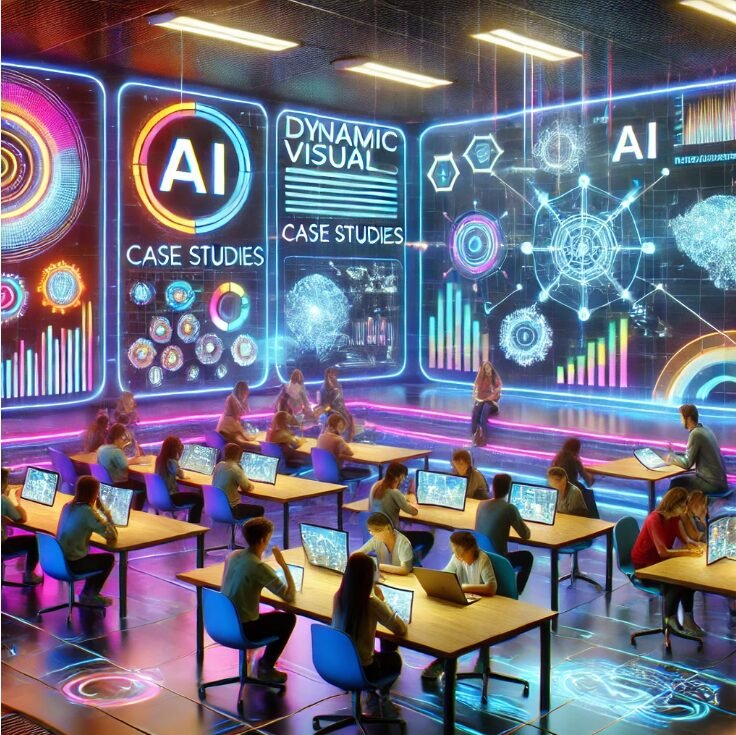The rise of generative AI, through tools like ChatGPT, Bard, and Claude, has transformed the way students approach case studies. The process of preparing for case discussions, traditionally focused on analysing complex problems and exploring multiple perspectives, is now being redefined as students leverage AI tools to quickly generate potential solutions. This shift is not just altering the landscape of learning but also setting the stage for the future of classroom case studies, where AI plays an integral role in enhancing both teaching and learning experiences.
Educators who once feared that AI might diminish the educational value of case studies can instead view this advancement as an opportunity. When used effectively, generative AI can deepen students’ understanding, expand discussions, and prompt innovative thinking. But what does this future look like? How will the integration of AI in case studies reshape the classroom? Here’s a glimpse into what lies ahead.
Case Studies vs. White Papers: What’s the Difference and When to Use Each?
1. AI-Powered Case Studies Will Drive Deeper Analytical Skills
In the classroom of the future, case studies won’t merely be about finding
“right answers”
but about how well students engage with AI-generated responses to scrutinise, refine, and question them. Generative AI tools are designed to produce answers based on vast datasets, drawing from patterns to suggest probable outcomes. However, these answers, generated through probabilistic models, are by no means definitive.
The power of AI in education lies in its ability to present a broad spectrum of perspectives and possibilities that students can critically evaluate. For instance, students might ask an AI model to propose a solution for a case about entering a new market. Instead of accepting the AI’s response as a final answer, the class can explore why certain factors were prioritised over others and whether different data inputs would produce more relevant or viable options.
2. Case Study Discussions Will Be More Dynamic and Interactive
Generative AI has the potential to transform case discussions into more dynamic and interactive experiences. Instead of relying solely on static case materials, instructors can use AI tools to adapt and customise case studies based on real-time inputs from students.
The future of case studies will not be confined to pre-written materials
but will expand to include AI-enhanced scenarios that respond to the needs and interests of the class. This adaptability will make case studies more engaging and relevant, allowing educators to craft discussions that cater to the unique dynamics of each group.
5. The Role of Educators Will Shift to Curators and Facilitators
As generative AI becomes an integral part of case study preparation, the role of educators will evolve. Rather than being the sole providers of knowledge, educators will increasingly act as curators and facilitators of learning. They will guide students in using AI tools effectively, ensuring that AI-generated solutions are treated as starting points for deeper exploration rather than final answers.
In this new role,
Educators will need to focus on asking the right questions that challenge students to think critically about AI-generated content.
By steering the discussion, educators can help students navigate the complex landscape of AI-generated insights, ensuring that they don’t simply accept these solutions at face value but use them as tools for deeper learning.
The Future Classroom of Case Studies
Generative AI is poised to revolutionise the way students engage with case studies, making classroom discussions more dynamic, collaborative, and insightful. As students use AI to prepare for case discussions, they will be better equipped to analyse complex problems, consider multiple perspectives, and make informed decisions in uncertain environments.
However, the key to unlocking the full potential of AI in case studies lies in how educators embrace this technology. By using AI to enhance, rather than replace, traditional case study methods, educators can create richer, more engaging learning experiences that prepare students for the complexities of the real world.
Visit The Case HQ for 95+ courses
Read More:
Why Research Publications are Critical in Understanding Global Health Trends
Exploring the Real-World Impact of Case Studies in Urban Planning
Breaking Down a Case Study: An Interactive Walkthrough
Case Studies in Education: A Comprehensive Overview
The Emergence of Case Studies in Behavioral Sciences
Influencing Change: Case Studies in Nonprofit Organizations
Case Studies: Paving the Way for Inclusive Education
Unveiling the Power of Case Studies in Renewable Energy



Responses